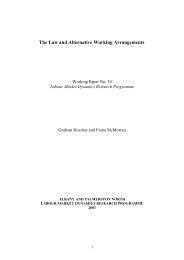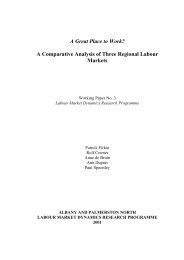transitions in the south waikato labour market: an ethnographic study
transitions in the south waikato labour market: an ethnographic study
transitions in the south waikato labour market: an ethnographic study
Create successful ePaper yourself
Turn your PDF publications into a flip-book with our unique Google optimized e-Paper software.
3. WELFAREJust a small proportion of those <strong>in</strong>terviewed received some form of welfare dur<strong>in</strong>g <strong>the</strong><strong>study</strong> period. Their experiences were predom<strong>in</strong><strong>an</strong>tly <strong>in</strong> relation to <strong>the</strong> DPB, thoughone m<strong>an</strong> was unemployed for six months. Be<strong>in</strong>g heavily <strong>in</strong>volved <strong>in</strong> a sport, he hadquit his job <strong>an</strong>d travelled to <strong>an</strong>o<strong>the</strong>r region to tra<strong>in</strong> <strong>an</strong>d compete dur<strong>in</strong>g this time. Heseems to have been able to secure a benefit whilst do<strong>in</strong>g this, but said little about <strong>the</strong>circumst<strong>an</strong>ces. At <strong>the</strong> end of <strong>the</strong> season, he got full-time work with little difficulty.Two of <strong>the</strong> women who received <strong>the</strong> DPB also had some additional experiences <strong>in</strong>relation to <strong>the</strong> UEB. One received this benefit for about six months after los<strong>in</strong>g afactory job. She spent this time do<strong>in</strong>g two tra<strong>in</strong><strong>in</strong>g programmes for <strong>the</strong> unemployed(as outl<strong>in</strong>ed earlier <strong>in</strong> this report) before f<strong>in</strong>d<strong>in</strong>g she was pregn<strong>an</strong>t. As she becamequite ill dur<strong>in</strong>g this time, she stopped look<strong>in</strong>g for work <strong>an</strong>d went to live with herpartner when <strong>the</strong> child was born. Though she, personally, stopped receiv<strong>in</strong>g a benefitat this po<strong>in</strong>t, because he was unemployed, <strong>the</strong> family cont<strong>in</strong>ued to be supported by <strong>the</strong>UEB. S<strong>in</strong>ce <strong>the</strong>y had separated before she was <strong>in</strong>terviewed – hence her receipt of <strong>the</strong>DPB – <strong>the</strong> husb<strong>an</strong>d’s experiences of unemployment c<strong>an</strong>not be considered. She onlymade brief references to this time, f<strong>in</strong>d<strong>in</strong>g it quite a struggle f<strong>in</strong><strong>an</strong>cially. So much sothat, despite hav<strong>in</strong>g a new-born, she tried unsuccessfully to get work herself.I had [my son] <strong>an</strong>d [my husb<strong>an</strong>d] wasn’t work<strong>in</strong>g at <strong>the</strong> time <strong>an</strong>d I wasw<strong>an</strong>t<strong>in</strong>g to have a stable <strong>in</strong>come because we were on <strong>the</strong> benefit.When one of <strong>the</strong> o<strong>the</strong>r recipients of <strong>the</strong> DPB reconstituted a relationship, her partnerwas unemployed so this family was also supported for a time through <strong>the</strong> UEB. Inorder to cope f<strong>in</strong><strong>an</strong>cially, she carried on with part-time work she had been <strong>in</strong>volved <strong>in</strong>whilst a s<strong>in</strong>gle parent. Given that <strong>the</strong>se people offer <strong>the</strong> predom<strong>in</strong><strong>an</strong>t <strong>an</strong>d most detailedexperiences of welfare, <strong>the</strong> focus of this section now turns to <strong>the</strong> experiences of thosewho received <strong>the</strong> DPB.(i)Domestic Purposes BenefitFour women <strong>an</strong>d one m<strong>an</strong> received <strong>the</strong> DPB dur<strong>in</strong>g <strong>the</strong> <strong>study</strong> period, all as <strong>the</strong> resultof <strong>the</strong> break-up of <strong>the</strong>ir marriages or relationships. Movement onto this benefit hadbeen quite recent for three of <strong>the</strong> women when <strong>the</strong>y were <strong>in</strong>terviewed. The o<strong>the</strong>rwom<strong>an</strong> <strong>an</strong>d <strong>the</strong> m<strong>an</strong> had both moved off this benefit dur<strong>in</strong>g <strong>the</strong> <strong>study</strong> period, <strong>the</strong> m<strong>an</strong>after just under a year, <strong>an</strong>d <strong>the</strong> wom<strong>an</strong> after n<strong>in</strong>e <strong>an</strong>d a half years (five of which predated<strong>the</strong> <strong>study</strong> period). She was <strong>the</strong> wom<strong>an</strong>, noted above, who had reconstituted herrelationship. The m<strong>an</strong> was able to stop receiv<strong>in</strong>g <strong>the</strong> DPB after gett<strong>in</strong>g work.Life on <strong>the</strong> DPB was, for this group, a difficult time. As she had also spent timereceiv<strong>in</strong>g <strong>the</strong> UEB, this wom<strong>an</strong> felt that people’s general attitudes towardsbeneficiaries were quite poor.I th<strong>in</strong>k [people] need to lighten up a bit on <strong>the</strong> beneficiaries <strong>an</strong>d mak<strong>in</strong>g iteasier. It’s not easy.This sense of struggle was echoed by o<strong>the</strong>rs. Though this wom<strong>an</strong> supplemented her<strong>in</strong>come with a boarder, it was still a difficult time.20




